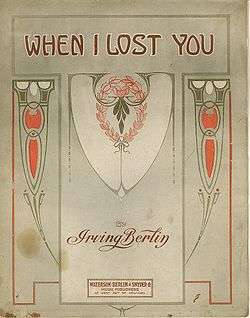When I Lost You

"When I Lost You" is a song with music and lyrics by Irving Berlin. It was written in 1912 after his wife of five months, the former Dorothy Goetz, died of typhoid fever. In it he poured out the grief of his loss; it was the only song that he ever admitted had such a connection to his own life. The song, a ballad, was unlike any of Berlin's previous songs, which were upbeat tunes written to take advantage of the dance craze. The song is in a slow waltz tempo. It became Berlin's first hit ballad.[1]
Berlin had published 130 songs by this point, none of which previously had revealed his ability to write with moving sentiment about his own personal pain.[2]
Background
Dorothy Goetz was one of many singers who arrived at the Waterson, Berlin & Snyder offices after the success of Berlin's "Everybody's Doin' It Now".[3]
Composition
Berlin's initial attempts to resume songwriting after his wife's death were unsuccessful.[3] After accepting an invitation to visit Europe with Dorothy's brother Ray Goetz, Berlin composed "When I Lost You".[3]
The birds ceased their song
Right turned to wrong
Sweetheart when I lost you
A day turned to years
The world seemed in tears
Sweetheart when I lost you.[1]
- ^ ""When I Lost You" (sheet music p.1)". Waterson, Berlin & Snyder. Retrieved 2008-10-04.
Strengthened by the knowledge that his life had some direction, he returned to his trick piano for solace, and this time attempted to write about his wife's death rather than avoid it. The result, a ballad called "When I Lost You," was unlike any song Berlin had previously written. It was an exceedingly simple and stately waltz employing a bittersweet harmony underneath the melody; diminished seventh chords further added melody. It was the only song Berlin ever admitted had a basis in the events of his life.[3]
 |
|
| Problems playing this file? See media help. | |
| Wikisource has full lyrics and sheet music: |
Reception
Berlin did not make promotional appearances for the song during its first year of release, yet the circumstances of his brief and tragic marriage were common knowledge.[3] The following year he performed the song in London.[3]
Footnotes
- ↑ Furia, Philip (1990). The Poets of Tin Pan Alley:A History of America's Great Lyricists. New York: Oxford University Press. pp. 51–52. ISBN 0-19-506408-9.
- ↑ Wilder, Alec (1990). American Popular Song: The Great Innovators 1900-1950. New York & Oxford: Oxford University Press. p. 96. ISBN 0-19-501445-6.
- 1 2 3 4 5 6 Laurence Bergreen (1996). As Thousands Cheer: The Life of Irving Berlin. Da Capo Press. pp. 81–85. Retrieved 2008-10-04.